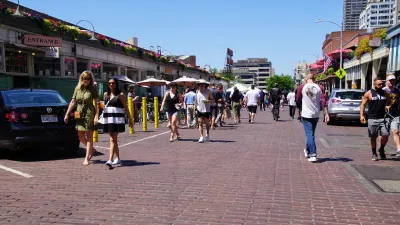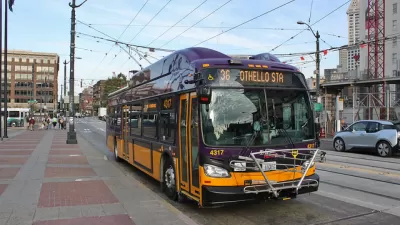According to one local writer, the city’s low rate of car ownership should encourage officials to support public transit and reduce parking minimums.

Over 20 percent of Seattle households do not own a car, according to a report from the Seattle Times. According to Seattle Bike Blog’s Tom Fucoloro, this signals that the city should be investing in transit and eliminating parking requirements that drive up the cost of housing.
Fucoloro notes that “The car-free households tend to be concentrated in dense neighborhoods with quality transit service like Capitol Hill, downtown and especially the U District and the International District.” But too many Seattle transit lines end service early in the day, and many trails lack nighttime lighting.
Fucoloro also suggests thinking outside the urban box and vastly expanding programs such as King County Metro’s Trailhead Direct, which helps people access outdoor recreation opportunities without a car. “Expanding rural transit across the state will not only provide service to people who live in those communities, but it will also help the increasing number of car-free residents access more places.”
FULL STORY: Balk: Car ownership keeps dropping in Seattle

Study: Maui’s Plan to Convert Vacation Rentals to Long-Term Housing Could Cause Nearly $1 Billion Economic Loss
The plan would reduce visitor accommodation by 25,% resulting in 1,900 jobs lost.

North Texas Transit Leaders Tout Benefits of TOD for Growing Region
At a summit focused on transit-oriented development, policymakers discussed how North Texas’ expanded light rail system can serve as a tool for economic growth.

Why Should We Subsidize Public Transportation?
Many public transit agencies face financial stress due to rising costs, declining fare revenue, and declining subsidies. Transit advocates must provide a strong business case for increasing public transit funding.

How to Make US Trains Faster
Changes to boarding platforms and a switch to electric trains could improve U.S. passenger rail service without the added cost of high-speed rail.

Columbia’s Revitalized ‘Loop’ Is a Hub for Local Entrepreneurs
A focus on small businesses is helping a commercial corridor in Columbia, Missouri thrive.

Invasive Insect Threatens Minnesota’s Ash Forests
The Emerald Ash Borer is a rapidly spreading invasive pest threatening Minnesota’s ash trees, and homeowners are encouraged to plant diverse replacement species, avoid moving ash firewood, and monitor for signs of infestation.
Urban Design for Planners 1: Software Tools
This six-course series explores essential urban design concepts using open source software and equips planners with the tools they need to participate fully in the urban design process.
Planning for Universal Design
Learn the tools for implementing Universal Design in planning regulations.
City of Santa Clarita
Ascent Environmental
Institute for Housing and Urban Development Studies (IHS)
City of Grandview
Harvard GSD Executive Education
Toledo-Lucas County Plan Commissions
Salt Lake City
NYU Wagner Graduate School of Public Service




























